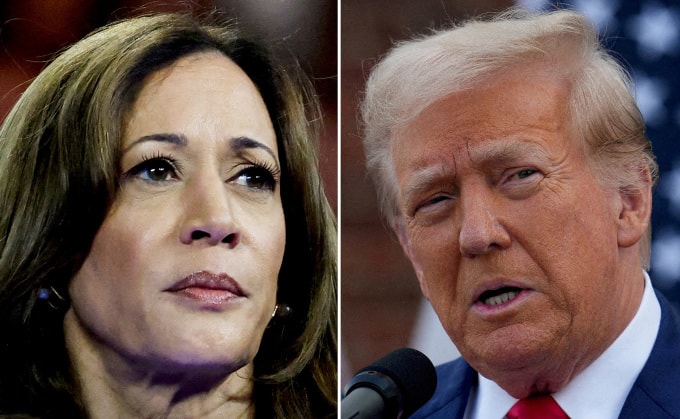October of US election years often holds surprises that can change the position of candidates in the race to the White House.
"I expect something will happen in October, as usual," former US Secretary of State Hillary Clinton said in an interview on September 27. "There will be efforts to distort and misrepresent Kamala Harris, who she is, what the vice president represents or has done."
Mrs. Clinton mentioned the "October surprise", an effect that appears near the US election day in early November, which can affect the position of the presidential candidate in the race to the White House. The former Secretary of State ran for the election in 2016 and was said to be at a disadvantage, leading to her loss, because of this factor.
Oscar Winberg, an expert on US politics at the Turku Institute for Advanced Studies in Finland, explains that "October surprises" usually come in three forms: US diplomatic developments on the international stage, past political scandals exposed in the form of leaks, or serious domestic events, such as natural disasters, pandemics, and criminal investigations.

The phrase "October surprise" was popularized during the 1980 election between Republican candidate Ronald Reagan and President Jimmy Carter. This was the time of the Iran hostage crisis, when dozens of American citizens were held by Tehran.
The Reagan camp feared that Mr. Carter would create an "October surprise" by making Iran release the hostages right before the November 4 election, opening up the incumbent President's chance of victory.
Some sources allege that to forestall this scenario, William J. Casey, Reagan’s campaign manager, met with Iranian representatives in Spain in July and August. The meeting led to an agreement in October 1980 in Paris, France, promising a future Reagan administration to ship weapons to Iran through Israel in exchange for Tehran holding hostages until after the election.
Ultimately, Reagan won the election, and just minutes after the new president finished his inaugural address in January 1981, Iran announced the release of the American hostages. The US Senate and House of Representatives then opened investigations, but both concluded that there was insufficient evidence to prove the accusation that Reagan's side had made a deal with Iran.
In October 2016, the New York Times published Trump’s 1995 tax returns, revealing that the $900 million loss he claimed at the time may have allowed him to avoid paying federal taxes for 18 years. On October 8, a 2005 recording was released in which Trump bragged about groping women.
Also this month, Wikileaks released thousands of emails leaked from Hillary Clinton’s campaign. The emails contained excerpts of Clinton’s speeches at internal events for major financial firms, showing her supporting many positions that benefit the super-rich. She also praised a budget plan that would cut Social Security and admitted that she felt “disconnected” from the middle class, despite campaigning claims that she was fighting for them.
The turning point was on October 28, just 11 days before the general election, when the director of the Federal Bureau of Investigation (FBI) announced the resumption of the investigation, which had ended in July of the same year, into allegations that Mrs. Clinton used a personal email to handle classified information during her tenure as Secretary of State.
After the news broke, the former secretary of state’s approval rating in polls dropped by 1.3 percentage points. The developments are believed to have negatively affected Mrs. Clinton in her tight race with Mr. Trump. The Republican candidate later won the election.
Devlin Barrett, a reporter for the Washington Post, writes in his bookOctober Surprisepublished in 2020 that although the FBI did not mention the content of Mrs. Clinton's emails, the information about resuming the investigation "cost her the election."
“The October Surprise shows that the closer you get to the election, the more information can sway things,” said David Greenberg, a political historian at Rutgers University in New Jersey.
A major scandal in July is unlikely to have much impact, Greenberg said, unless it is serious enough to cause a candidate to drop out of the race. “But if that same scandal comes up a week or two before the election, it will be a hindrance.”
In the 2020 election, the October series of surprises began with the New York Times publishing the results of an investigation into Mr. Trump's tax records, showing that he paid only $750 in taxes in 2016 and 2017, with debts of more than $400 million.
Covid-19 is also considered a "black swan" for Mr. Trump. The epidemic appeared in the White House, while Mr. Trump had previously downplayed and made controversial statements about Covid-19. In this re-election effort, Mr. Trump lost to his Democratic opponent Joe Biden.

This year’s race for the White House is unpredictable, with national polls showing little difference between Mr. Trump and Vice President Harris. Meanwhile, US and global politics hold a series of potential developments that could tip the balance between the two candidates.
The United States has just been hit by superstorms Helene and Milton, described as "the strongest storms of the century". Helene caused major damage in Georgia and North Carolina, two battleground states in the 2024 election season. Mr. Trump has criticized the Biden administration for its response and relief efforts after the storm.
The Middle East is on the brink of all-out war as tensions between Israel and Iran escalate. US influence over Israel is waning and Washington risks being drawn into the conflict. The tensions could push oil prices higher, impacting the cost of living - one of voters' top concerns.
Mr. Trump is currently embroiled in a series of legal scandals. A federal judge in early October released a new case from special prosecutor Jack Smith regarding the Capitol Hill riots and efforts to sway the 2020 election, one of four prosecutions the former president faces.
Winberg said that "October surprises" have become more common in recent years, due to the increasing number of disinformation efforts, but that they are no longer as influential as they once were, because most voters are now loyal to the party they chose.
Additionally, more Americans are voting early by mail, a trend accelerated by the Covid-19 pandemic, so last-minute developments don’t affect them as much.
However, Winberg also points out that the race is so tight right now that the impact of the effect cannot be underestimated. "In today's polarized, two-party political system in the United States, each side is at 45-47%, so there are not many undecided voters left to appeal to. But that also means that small changes can make a difference," he says.
University (according to VnExpress)